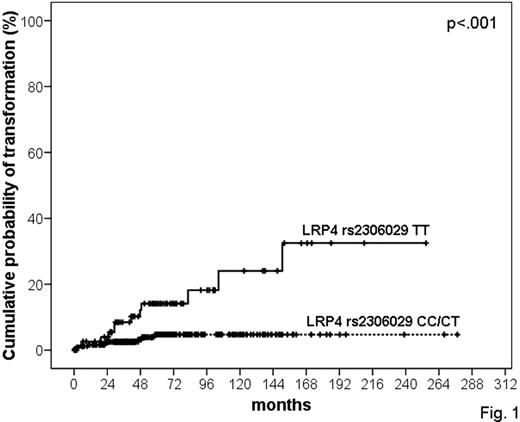Abstract
Abstract 2340
Poster Board II-317
Richter syndrome (RS) represents the transformation of chronic lymphocytic leukemia (CLL) to aggressive lymphoma, most commonly diffuse large B-cell lymphoma (DLBCL). Mechanisms and risk factors of CLL transformation to RS are known only in part. This study aimed at exploring the role of the host genetic background in RS transformation and was based on a consecutive series of 331 CLL, of which 21 had transformed to RS (all clonally related to the CLL clone). Twenty eight additional cases of clonally related RS were also collected for validation purposes. Using an educated guess approach, SNPs were selected according to the following criteria: i) reported association with CLL prognosis; ii) minor allele frequency >5% in Caucasians. Accordingly, 45 SNPs from 45 genes (APOE, BARD1, BRCA2, CD5, CPA4, CPT2, CYP2C9, CD38, DUSP13, ENPP5, ERBB2IP, ERCC5, ERCC6 ESPL1, FHL5, FOXN1, GALNACT2, GTF2E1, HIPK4, IL16, IL19, INHBC, KLRC4, KRT1, LAMA2, LILRA4, LRP2, LRP4, MDM2, MGMT, MMP10, MYBPC3, PMS2, POLB, SEC23B, SEMA3C, THBS1, TOPBP1, TYR, USP47, XRCC2, ZNF169, ZNF527, ZNF573, IRF4) were genotyped by SNP-minisequencing. The primary endpoint of the study was cumulative probability of transformation measured from CLL diagnosis to RS transformation, death or last follow-up. Univariate Cox analysis controlled for multiple comparisons by FDR testing identified LRP4 rs2306029, a SNP affecting the low density lipoprotein receptor protein 4 gene, as the sole SNP associated with RS transformation. CLL who carried LRP4 rs2306029 TT variant genotype displayed a higher risk of transformation (Events/N: 12/79; 5-year risk: 14.1%) compared to patients carrying the LRP4 rs2306029 CT/CC genotypes that contained the wild type allele (Events/N: 9/252; 5-year risk: 4.7%) (HR:4.08; p<.001; q=.040) (Fig. 1). Other variables at CLL diagnosis associated with an increased risk of RS were advanced Binet stage (p<.001), lymph node size >3 cm, LDH elevation (p<.001), CD38 expression (p=.010), ZAP70 expression (p=.017), unfavorable FISH karyotype (p<.001), IGHV homology >98% (p<.001), and stereotyped HCDR3 (p<.001). None of the patient subgroups carrying the above risk factors was enriched with the LRP4 rs2306029 TT variant genotype (p>.050 in all instances), suggesting that LRP4 rs2306029 TT is not a surrogate of other RS risk factors. Multivariate Cox analysis selected LRP4 rs2306029 TT as an independent predictor of RS (HR:5.66; p<.001), along with stereotyped HCDR3 (HR:5.02; p=.001), and CD38 expression (HR:3.47; p=.011). LRP4 rs2306029 genotyping in an independent RS series (n=28) collected for validation purposes confirmed the enrichment of TT genotype and T alleles observed in the original RS series (TT genotype: 11/28 39.2% vs 12/21, 57.1%; p=.139; T allele: 60.7% vs 64.3%; p=.811). To date, the sole other host genetic factor associated with RS transformation is the CD38 rs6449182 SNP (Aydin et al, Blood 2008; 111: 5646). LRP4 rs2306029 and CD38 rs6449182 genotypes displayed statistical interaction and identified CLL subgroups at different risk of transformation (p=.043). LRP4 rs2306029 is a non-synonymous SNP mapping to exon 31 of LRP4 and leading to Ser1554Gly amino acid substitution. In silico analysis with PupaSuite, PolyPhen, and SNPeffect algorithms predicted LRP4 rs2306029 T variant allele to have functional effect on LRP4 protein. In silico elaboration of public data sets revealed that LRP4 gene expression levels did not differ among LRP4 rs2306029 genotypes (p=.743). LRP protein expression in CLL is unknown and was analyzed in 26 cases. By flow cytometry, LRP4 was expressed in all cases with a median percentage of expression of 92.0% and a MFI of 78.0 that did not vary among genotypes (p=.527 and p=.964, respectively). By immunohistochemistry on bone marrow biopsies, LRP4 showed an expression pattern that varied according to genotype of the rs2306029 SNP, being cytoplasmic in CLL carrying the T allele and nuclear in CLL carrying the CC genotype. The conclusion of our study are threefold: i) LRP4 rs2306029 TT genotype is an independent predictor of CLL transformation to RS; ii) LRP4 protein is expressed in CLL cells; iii) LRP4 rs2306029 genotype may affect the expression pattern of LRP4 in CLL cells. Since LRP4 is involved in suppressing Wnt signalling, the LRP4 rs2306029 T variant may have pathogenetic relevance for RS development.
No relevant conflicts of interest to declare.
Author notes
Asterisk with author names denotes non-ASH members.


This feature is available to Subscribers Only
Sign In or Create an Account Close Modal